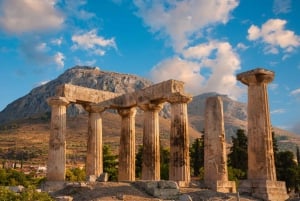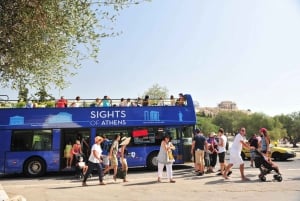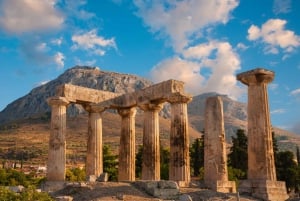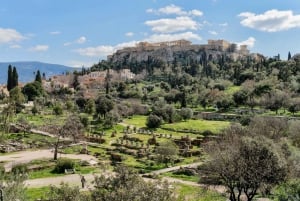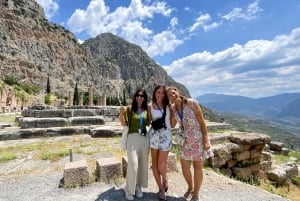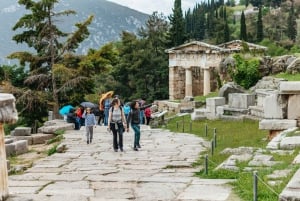FAQs about Athens
Here at My Guide Athens have put together a list of the most commonly asked questions about . If you feel there is something worth adding, please feel free to contact us.
When to go?
Athens is a major cultural centre with significant events occurring all the time. This makes it highly visited all year round. During the summer many visitors pass through Athens on the way to the islands and it can sometimes be packed with tourist excursion groups. In August the city is much less crowded as most of the Athenians leave the city for their holidays but even though fairly serene it is not quite the best time to visit as the weather can be hot and humid. The ideal time to visit is both late spring or early autumn, when the weather is mild and the atmosphere more pleasant and relaxed. Check out our practical information section for more detailed information. Also, you can see our weather menu for weather information and five-day forecast.Â
How many days do I need?
Thatâs really difficult to answer! If you are travelling from Europe for business or for an event then one to two days are perfect. If you are visiting Athens for the first time then three to five days is the minimum we recommend if you want to take full enjoyment with no rush.  There is so much to see and enjoy. Few cities boast a historic heritage as impressive as that of Athens. But although history and culture might draw travellers to this unique destination with the iconic Acropolis rising majestically above the city, Athens has a lot more to offer than a thorough on-site history apprenticeship, endless hours in museums and a particularly rich treasure trove of antiquities. Actually, it is the cityâs authenticity; vibe, diversity and atmosphere that really astonish visitors and make them want to return. Once in the cityâs historic centre you might feel that you are walking through a giant archaeological park but strollers will be amazed by the quiet shaded cafes, quaint tavernas, art galleries, lively bars, chic restaurants and sophisticated shopping strips that define Athensâ contemporary profile, which is a daily balancing act between history and tradition and evolution.Â
What should I wear?
Athens is a cosmopolitan capital. Athenians like to be clean and stylish; with the older generation dressing up more formally and the younger generation in a more smart casual, comfortable chic style.  Most expensive restaurants and clubs require more formal dressing.
In the summer pack light clothing in light colours. Make sure to include comfortable or athletic shoes for walking and visiting archaeological sites. Of course, do not forget your swimming suit, sunglasses and sun block protection for the wonderful days on the beach. If you are heading to the beautiful Greek Islands then flat shoes are highly recommended to wonder around the pebbled-stoned streets at ease! Â
Remember to also pack some items with long sleeves and trousers or long skirt so you can cover respectably when visiting churches and monasteries. Â
During the winter you will certainly need warm clothes, a coat and boots. If you are planning to head up the snowy mountains for ski-ing, pack your ski attire, gloves and scarf.
However, in the case you forget something then no worries in Athens you can find and buy everything!
What I should not miss?
Athens is one of the most cosmopolitan capitals in the world where you can never be bored. Athens has no end of attractions and museums, but if you are short of time donât miss visiting  and , The New Acropolis Museum and the Change of Guards at Syntagma Square.  In case you have some more time, drive along the breath-taking Saronic Gulf towards  and admire the sunset over the Aegean Sea, as viewed from the ruins, a sought-after spectacle...
Is Athens safe?
Athens is still one of the safest cities in Europe. It is however, advisable to take the logical precautions: lock the car, keep valuables in a safe face, avoid walking in dark, quiet streets alone and always take good care of your bag, wallet and passport.
What time do Greeks eat?
Greeks tend to eat late and food is a social event. Lunch can be around 3pm and dinner is after 9pm. Check out our guide to restaurants in Athens.
Is it true that Athens never sleeps?
Athens never sleeps. Even-though, Athens nightlife has been negatively affected by the economic recession, Athens is still the European queen of nightlife. Nightlife doesnât start before 10pm and Greek people are well known of having fun until early in the morning. Athens offers more opportunity for nightlife than any other city: from ancient Greek drama, theatres, musicals, world famous orchestras and concerts to unique live musical stages, 'bouzoukia', bars and clubs. People love going out and having fun with friends. For more information visit our selected nightlife guide.
Should I take a specialist tour in Athens or is it better to travel independently?
Whether or not you decide to take a tour in Athens depends on your personal preference. While some visitors like to have a pre-arranged package or custom tour with an expert guide, others prefer to organise their trip themselves at their own ease and comfort. In Athens there are many professional amusing and informative tours to choose from but if you opt to travel independently, Athens and beyond, are easy to navigate. Login in our Members Area and save your favourites, organise your trip and print it to take it with you, send to friends or take it on your mobile.
Who were the twelve Gods of Greece?
- Aphrodite: the goddess of love and beauty. Her son was Eros, god of love.
- Apollo: god of the sun, light, medicine and music.
- Ares: dark god of war.
- Artemis: independent goddess of the hunt, the forest, wildlife, childbirth, and the moon. She was the twin sister of Apollo.
- Athena: daughter of Zeus and goddess of wisdom, war, and crafts. Athena is the virgin patroness of Athens.
- Demeter: goddess of agriculture and harvest and mother of Persephone.
- Hephaestus: god of fire and the forge. The husband of Aphrodite.
- Hera: the queen of gods, wife of Zeus, protector of marriage and mother of Hephaestus.
- Hermes: the messenger of the gods, god of business.
- Hestia: calm goddess of home and hearth.
- Poseidon: god of the sea, horse and earthquakes.
- Zeus: supreme lord of gods, god.











